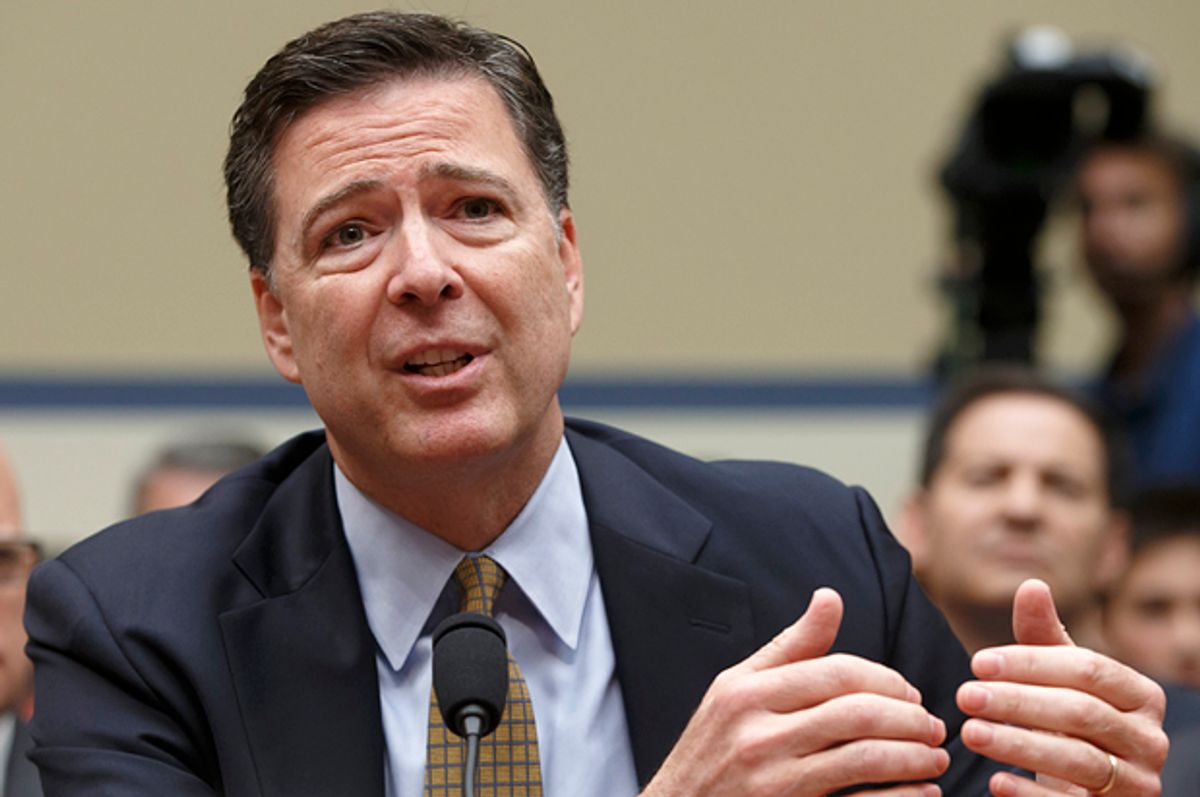Even as news stories of numerous interactions between Russia and associates of President Donald Trump have continued to break on a frequent basis, congressional Democrats have become more circumspect in their rhetoric about the subject. On Sunday, Virginia's Sen. Mark Warner told CNN that while there is "a lot of smoke" in terms of contacts, "we have no smoking gun at this point." In large measure, that is because any legal prosecution or impeachment actions would have to rely upon real documentation or sworn public statements. Thus far, those things do not exist.
But fired FBI Director James Comey's upcoming public testimony before the Senate Intelligence Committee may provide a way of bringing together the numerous threads of the Russia scandal in a way that becomes a historical moment.
"There are all kinds of rumors around, there are newspaper stories, but that's not necessarily evidence," Sen. Dianne Feinstein, the California Democrat, said on CNN last month.
The sheer volume of information involved with tracking the Trump-Russia story and the way that some aspects of it can be easily conflated or misunderstood has also made the story much more difficult for the public to follow. That's why, as Paul Rosenberg wrote on Sunday, this scandal is probably best compared with the Iran-contra controversy of former President Ronald Reagan than with former president Richard Nixon's Watergate scandal. The complexity of both affairs should give pause to Trump opponents since neither Reagan nor then Vice President George H. W. Bush were ever charged with any sort of criminal behavior.
Nonetheless, the Iran-contra scandal had its share of riveting moments that could have turned into something bigger, one of which was the multiple days of congressional testimony from then Lt. Col. Oliver North, the Reagan administration's National Security Council staffer who was at the center of a scheme to sell weapons to the government of Iran and then transfer the money to a Nicaraguan anti-communist militia.
Thus far Trump-Russia scandal has not had anything remotely as visually gripping as the arrogant North admitting to deceiving Congress or a sweaty and shifty Nixon lying through his teeth on TV. Overwhelmingly, the news that's been broken thus far has been by well-sourced and intrepid print reporters disclosing details that the administration wants kept quiet.
The closest to such thing that's happened so far was Trump's May admission during an interview with NBC anchor Lester Holt that he had fired Comey because the agency wouldn't wrap up its inquiry into alleged Russian efforts to interfere in the 2016 presidential election. “When I decided to just do it, I said to myself, ‘You know, this Russia thing with Trump and Russia is a made-up story,'” Trump volunteered to Holt.
This Thursday, Comey's congressional may prove pivotal.
Or it might not.
None of the Senate Intelligence Committee Republicans come close to being in open opposition to the president and they are almost certain to lean heavily on a June 2 National Review essay by former U.S. Assistant Attorney Andrew C. McCarthy, arguing that there is a great distinction between "pressure" and "obstruction of justice." As part of that argument, Senate GOPers will certainly refer to previous testimony that Comey gave May 3 to a routine congressional oversight hearing, stating that he had not received any pressure from his superiors at the Department of Justice to rein in the Russia investigation. If he admits that Trump asked him privately to end the inquiry, more partisan Republicans are likely to accuse Comey of having committed perjury.
It's a specious allegation, however, considering that when he was asked about "pressure," the original question was only in reference to the Department of Justice, not the White House.
More clever Republicans are likely to make some version of McCarthy's point:
No one in America knows the law of obstruction better than Comey, who has spent much of the last 30 years as a high-ranking federal prosecutor and the federal government’s top cop. He is well aware that pressure is not obstruction. In this instance, moreover, Trump’s exertion of pressure was relatively mild: He did not deny Comey the freedom to exercise his own judgment; the president expressed hope that Comey’s judgment would be exercised in Flynn’s favor. Any of us who has ever had an overbearing boss is familiar with this kind of prodding. It can be unpleasant, even anxiety-inducing. But Comey is a big boy, he has a history of not being intimidated by presidents, and what we’re talking about here is not exactly the rack.
This is no doubt why Comey did not resign, and did not report to the Justice Department, his FBI staff, or Congress, that he had witnessed — indeed, been the victim in a sense — of an obstruction of an FBI investigation. Let’s stipulate that Comey has an outsized conception of what an FBI director’s degree of independence from his political superiors should be. He may therefore be convinced that Trump’s browbeating on Flynn’s behalf was terribly inappropriate. That still doesn’t make it obstruction . . . not even close.
Democrats, meanwhile, will likely focus on the private conversations that the fired FBI director had with the president about Russia as well as chats he may have had with other administration officials.
While Comey is said to have wanted his testimony to be a public matter, how much he will be able to answer curious senators' questions remains in doubt. In this regard, a fireworks-filled hearing is likely to mean that Comey has said much of the same things during his interviews with the investigation team of special counsel Robert Mueller, himself a former FBI chief.
But if Comey is quiet on Thursday, that could be a much worse indicator for Trump.
In either case, expect Comey's first congressional appearance since his firing to present the Trump-Russia story so far into a framework that is more compact and easier to follow.



Shares